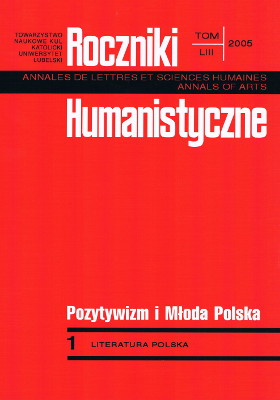The Conception of „Over-Civilizing” in Works by Eliza Orzeszkowa
Abstract
Eliza Orzeszkowa's views on civilization, its essence and tasks evolved in her lifetime: from the attitude full of approval, faith in the intellectual and moral progress of mankind, to the attitude of skepticism and disappointment with civilization that does not bear the expected fruit. From the beginning of the 1880's the author of Pierwotni (The Primary) in her works ever more often outlines the picture of two types of civilization and their representatives: the true civilization (postulated, spiritual, being a kind of process) and the false one (material, being a kind of ceiling, a kind of the achieved status). Growing criticism and distrust in a wrongly understood and realized civilization make her notice more and more symptoms of its disproportionate development, exaggeration, overgrowth, that is its „over-civilizing”, as well as „over-aestheticizing” and „over-refining”. For Orzeszkowa civilization is rather an ability to distinguish good from evil and to increase good; it is spiritual culture and involvement in citizens' activities. The author of Melancholicy (The Melancholics) defends the right to a wise sadness over the invasion of pessimism, the right to suffering – against the hedonism and attitudinizing of decadents, she defends aesthetics from over-refining, dogmas – from lack of dogmas, the right to deficiency – from excesses, and civilization – from over-civilizing. The writer's protest against degeneracy of the modern world reached its summit in the sketch Na wspaniałej Wilhelmsstrasse (On the Glorious Wilhelmsstrasse) (1907), in which transformations of the West's culture and civilization she interpreted from the apocalyptic point of view and in a catastrophic mood. The mechanized and materialistic relations between people may be only cured, according to Orzeszkowa, by love and sacrifice – the true „worlds of civilization”.
Copyright (c) 2005 Roczniki Humanistyczne

This work is licensed under a Creative Commons Attribution-NonCommercial-NoDerivatives 4.0 International License.





